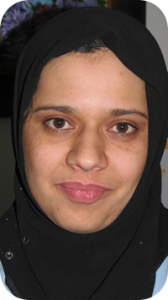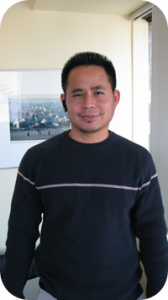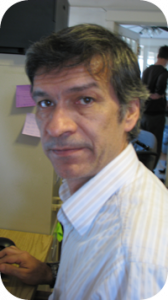We Were Refugees
New Canadians Tell Their Stories
Quick Links: Mie Tha’s Story | Palwasha’s Story | Alberto’s Story |
Mie Tha La’s Story: Refugee from Burma
My name is Mie Tha and I am a member of the Karen ethnic minority. Burma has many human rights violations. Certain ethnic groups like the Karen are persecuted. Forced labour and civil war have forced many Karen to flee to neighbouring countries. In 1994, when I was 17 years old, my family and I walked five days through the jungle to flee to Thailand. We spent 14 years in a Kareni refugee camp along the Thai-Burmese border. There are lots of refugee camps in the rainforest along the border. All are fenced in. Refugees are not allowed to leave the camps – if they do they can be arrested and deported back to Burma.
The provisions we got were mostly from international aid organizations – Canadian or Australian ones, for example. We got staple food, such as rice, oil and salt from them and could raise animals and grow vegetables. We had communal bathing facilities and every family had a clean and neat toilet. The houses were temporary structures, not very solid, and some people got killed when trees fell on them. Some international NGOs, such as MSF, provided us with health care.
The worst part about living in the camp was that our future was uncertain. Nobody knew what was going to happen to us. We all dreamt of going back to Burma but the future looked very bleak. We were also afraid that Burmese troops would come into the camps and attack us. This happened several times and a number of refugees got killed.
Thais are very friendly people but they treated us like second-class citizens. Thailand did not sign the UN convention related to the status of refugees. Because we were not recognized as refugees, we had no freedom to travel, no right to higher education and no right to marry Thai citizens. We were also not allowed to work in the country.
A group of Canadian teachers working in Japan came to visit the camp one day and decided to establish a charitable foundation to help us. They offered scholarship programs to the refugees and I applied for it. I was able to study education at a college in the southern Philippines for four years. I met my wife Jocelyn there, a Filipina who was my classmate. After I graduated I returned to the camp and started organizing education programs for the refugees. I realized that Jocelyn would be of great help and invited her to come over. She spent three years as an English teacher in the camp. She was not allowed to live there but she disguised herself as a Karen.
With the help of a scholarship from the World University Service of Canada (WUSC), my younger sister was able to move to Toronto in 2003 to study here. Four years later, the rest of my family was able to resettle to Canada as refugees. My wife Jocelyn was also accepted by the immigration officials.
Like many new immigrants we had adjustment problems at the beginning – for example related to the weather, the culture, to the physical differences of the country. However, we felt very blessed. I still remember what the head of Canadian immigration in Thailand said to us: This is a land of opportunity. And this has been very true for my family. Six months after I arrived here I passed a test with the Ontario Ministry of Attorney Generals to become an accredited court interpreter for the Karen language in Ontario. One year after I arrived I was offered a permanent position by the Jane Finch Community and Family Center in Toronto as host program worker to help young immigrants in Canada. Our son and our baby daughter were both born in Canada.
Palwasha Wadi’s Story: Refugee from Afghanistan

Palwasha Wadi
© MSF Canada, 2010
My name is Palwasha Wajdi. I am 24 years old and am from Afghanistan. When I was three months old my family fled to Pakistan because my country was at war with Russia. We lived in the city of Quetta near the border with Afghanistan. Life was hard for my family and other refugees from Afghanistan. First of all, there was the language issue. We did not speak Urdu or other languages spoken in Pakistan. Also, refugees lived in cheap houses which were often in very dirty areas. I have seen one-room dwellings without water and electricity that were shared by four families. Can you imagine what that is like? For most refugees it is difficult to find clean water and access to health care. There are no proper health care facilities. Many children do not get an education. Also, refugees from Afghanistan cannot get an I.D. card in Pakistan and therefore are not able to find a job –like my father, for example, who was a journalist in Afghanistan.
Refugees have a lot of psychological issues such as post-traumatic stress disorder. I have seen many women and children who were mentally disturbed, because when they migrate from Afghanistan to Pakistan, they face a lot of hardship – either on the way or after they arrive. Mothers are not able to find schools for their children. Often, children are sick but their parents do not have jobs and therefore no money to buy medicine or send their children to hospitals. These women need a lot of counselling.
After my father died, my mum went to Canada in 1999 and claimed refugee status, leaving my brother and me behind in Pakistan. When she was accepted she sponsored us and we came here as landed immigrants six years ago.
There were a number of challenges I needed to overcome when I moved here. First of all there was the language barrier – my English was not very good when I arrived here. Also, the high school I completed in Pakistan did not give me a certificate and I had to start from zero again to get a Canadian high school degree.
Now I feel finally settled. I am about to graduate from college and I want to work with refugees and immigrants because I realize that I can help them. I am doing a social services diploma specializing in immigrant and refugee studies. I feel that I am a very strong person now and I feel that no matter where I live – in Canada, Pakistan or Afghanistan, it is my responsibility to work for mankind, for people who are in need. I am grateful to Canada for providing me with the opportunity to continue my education, and become a strong person.
Alberto Gaona’s Story: Refugee from Colombia
My name is Alberto Gaona. I am from Colombia, where I worked as a social communicator with indigenous groups and Afro-Colombians, supporting them with their rights, especially land rights. Some people were not happy with my work. They wanted to take land away from the people I was working with – to plant palm oil trees for the lucrative production of bio-fuel. One day, in 2008, paramilitary forces threatened to kill me, my wife and my six-year-old son. It was the last in a series of threats against me but it was the first time my family was targeted as well. Some people I had worked with had already been killed.
We immediately went into hiding. I knew we needed to leave but I did know where to go. The next six weeks were a nightmare. It was like being a criminal who is being chased. At night we would move from one hiding place to the next. We knew that if we would stay for too long in one place they could find us. A refugee has no future – unless someone helps him build a new future.
After six weeks we managed to get to the United States but we did not want to stay there because of the role the US has played in my country. We decided to go to Canada because I have an uncle here. We first spent three weeks in Buffalo and I was so worried about not being able to enter Canada that I became really sick. We only had a bag of clothes with us. We had lost everything in Colombia, including our house. We claimed refugee status after we arrived in the country in October 2008 and the claim was accepted a year later.
We were very excited, but also sad because we knew we would not be able to see our friends or family for a long time. It took us a while to adapt to life here. Lots of things are different here, like the food , or the styles of clothing. We used to live in the tropical rainforest, in a very hot place, and we had never seen or touched snow before.
At the beginning I concentrated on learning English and then started doing volunteer work for the FCJ Refugee Centre in Toronto. I now have a part-time job there, receiving newcomers, helping them to fill in documents and translating for them.


